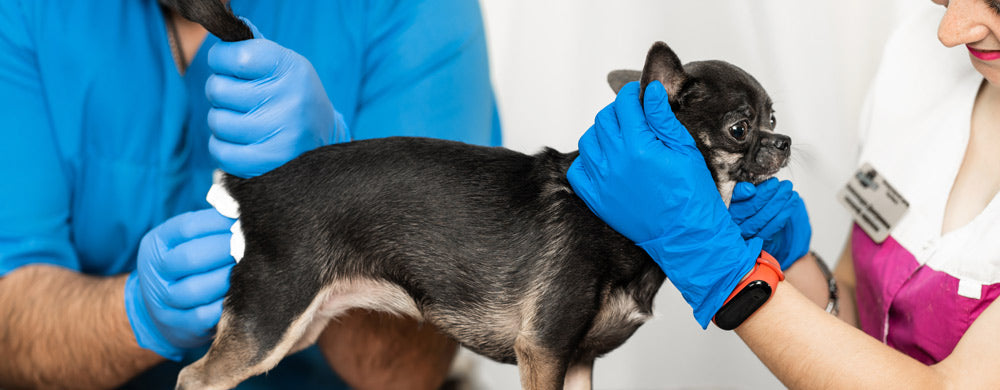Your basket is empty

Why Is My Dog Slow All of a Sudden?
September 04, 2020 7 min read
If your normally active dog is suddenly acting lethargic or slower, it can be a cause for concern. While age can be a factor for dogs becoming less energetic, there are a lot of other reasons why your dog might be slowing down.
Pain, arthritis, infections, parasites, anaemia, and organ disease are all possible causes for why your dog might be more tired or sluggish than usual.
---
---
Possible Causes
Lethargy in dogs can be down to old age or being a bit worn out after a big walk, but it’s a good idea to remain vigilant and look at other potential causes.
Not only can this help you figure out if something is seriously wrong with your dog in the immediate, but it can also help you keep an eye out for any issues in the future.
❊❊❊
Old Age
 Dogs are considered seniors when they’re around 7 years of age, but this might be earlier for large breeds. It’s normal for dogs to slow down as they age, but if this is accompanied with other symptoms, then it’s best to see a vet to be on the safe side.
Dogs are considered seniors when they’re around 7 years of age, but this might be earlier for large breeds. It’s normal for dogs to slow down as they age, but if this is accompanied with other symptoms, then it’s best to see a vet to be on the safe side.
In addition to being less energetic, elderly dogs often gain weight more easily and have duller senses. They’re also prone to developing conditions like arthritis, diabetes, cognitive dysfunction, cancer, kidney issues, and hearing/vision loss.
That’s why it’s important you put in extra steps to support your senior dog. Good nutrition, proper exercise, and natural supplements to boost your dog’s overall health can all help keep your dog in tip-top shape. As always, speak to your vet before you give your dog any supplements or make changes to their diet.
 Our Omega fish oil supplement is ideal for old and young dogs, both small and large. The capsules contain 100% natural omega-3, -6, and -9 fatty acids that provide your dog with essential nutrients they are unable to make on their own.
Our Omega fish oil supplement is ideal for old and young dogs, both small and large. The capsules contain 100% natural omega-3, -6, and -9 fatty acids that provide your dog with essential nutrients they are unable to make on their own.
Omega-3 is necessary for all-round health, while also harbouring anti-inflammatory properties that can reduce allergy symptoms or pain associated with conditions like arthritis. Omega-6 is required for cell function and cell membrane structure, as well as a healthy coat and immune system.
Lastly, omega-9 fatty acids assist with a healthy brain and cardiovascular system. As our Omega supplement contains all of these omega fatty acids, they give your dog everything they need to thrive.
❊❊❊
Injury
If your dog has an injury such as damaged ligaments or hip/elbow dysplasia, then they might move more slowly than usual. As dogs can’t explain to us when they’re in pain, it can be difficult to know if your dog has hurt themselves.
That’s why it’s important you check for subtle signs that might indicate something is wrong. Dogs experiencing pain can be more vocal than usual, as well as groom excessively, pant, tremble, go off their food, and have a rigid or stiff posture.
❊❊❊
Infection
An infection like kennel cough or parvovirus can make your dog become lethargic or tired. Both viruses are highly contagious and spread quickly between dogs not vaccinated against them.
One of the most common symptoms of kennel cough is a strong cough that resembles a goose honking. Your dog might also have sneezing, a runny nose, and a low fever.
Signs of canine parvovirus include loss of appetite, vomiting, foul-smelling diarrhoea (usually tinged with blood), fever, and collapse. In severe cases, it can even cause sudden death.

Kennel cough and parvovirus can be prevented by vaccinations. Parvovirus is particularly deadly to puppies, which is why you must get them vaccinated. Your dog will need a booster vaccine for both infections around every year to ensure they stay protected.
❊❊❊
Parasites
Parasites like fleas or ticks can be very dangerous to your dog if not properly taken care of. Severe infestations can result in anaemia, which causes the loss of red blood cells.
If your dog has anaemia, they will usually have low energy levels, poor appetite, and be reluctant to exercise. However, some dogs with anaemia might have no symptoms at all.
Minor cases can be treated relatively easy, but more severe cases can be life-threatening. It’s vital you take your dog to see a vet if you suspect anaemia to ensure they have a quick recovery.
You can prevent both of these parasites by using flea and worming treatments. Adult dogs usually need fleaing every 4 to 6 weeks and worming every 3 months.
❊❊❊
Arthritis
Arthritis is very common in elderly dogs, but it can also strike at any age. Dogs with this ailment will usually appear lethargic, irritable, and be wary of being touched. They might also lick or bite at painful joints and have poor mobility, like struggling to climb stairs.
These warning signs are often mistaken for “slowing down” or “getting old”, so it’s a good idea to get your dog checked out at a vet if they exhibit any of the symptoms above. While arthritis isn’t curable, it can be managed with medication, weight control, proper nutrition, and natural supplements.
Our MOBI supplement is specifically designed for hip and joint health, so it’s a great choice for dogs with arthritis or other joint issues. It contains glucosamine, chondroitin, New Zealand sourced green-lipped mussel, MSM, and curcumin (turmeric).
 The supplement is available in either tablet or powder form, so it’s easy to sprinkle over food or feed directly. Both forms come in a delicious chicken flavour for even the most finicky of eaters.
The supplement is available in either tablet or powder form, so it’s easy to sprinkle over food or feed directly. Both forms come in a delicious chicken flavour for even the most finicky of eaters.
MERIC is a turmeric-based joint supplement for dogs. Our supplement contains 95% standardised amount of curcuminoids (the active ingredients), making it one of the strongest and most potent formulas on the market. The black pepper extract (piperine) was added to maximise its bioavailability (the amount available to be used by the body) and consequently its benefits. All of these ingredients support your dog’s joints, as well as reduce inflammation and pain.
❊❊❊
Organ Disease
Lethargy or slowing down can be a symptom of kidney, heart, or liver disease. Although it’s not uncommon for older dogs to sleep more than their younger counterparts, sleeping excessively might be due to the disease’s toll on your dog’s body.
Dogs with heart failure often stop being as active as usual due to the weakening of their heart muscle. They can also display symptoms like lethargy, elevated breathing, coughing, and poor mobility.
In dogs with kidney failure, toxins begin to build up and cause side-effects such as excessive urination and thirst, poor appetite, depression, and sluggishness. Dogs with liver disease exhibit similar symptoms, as well as weight loss, vomiting, and diarrhoea.
❊❊❊
Metabolic Disease
Alongside organ disease, senior dogs are also susceptible to conditions of the metabolic system like diabetes, hypothyroidism, Cushing's disease, Addison’s disease, and hypoglycaemia. All of these can cause symptoms such as lethargy, depression, and decreased energy levels.
A lot of dogs don’t show signs of these diseases until they are at an advanced stage, which is why you should go to the regular checkups at the vet to ensure they are caught early.
❊❊❊
Kidney Cancer
Kidney tumours can either start inside the kidney itself or spread from another part of your dog’s body. Signs of kidney cancer include lethargy, increased thirst, bloody urine, depression, and vomiting.
If your dog has any of these symptoms, take to see a vet as soon as possible. Although listlessness or slow movements aren’t always a cause of concern, kidney failure can be fatal. Early detection of kidney cancer is key for the best chance of recovery.
❊❊❊
Cognitive Dysfunction Syndrome (CDS)
 Canine cognitive dysfunction or dementia is essentially the canine version of Alzheimer’s disease. Older dogs often get a “senior moment” every now and again, but make sure you don’t mistake dementia for part of the normal ageing process.
Canine cognitive dysfunction or dementia is essentially the canine version of Alzheimer’s disease. Older dogs often get a “senior moment” every now and again, but make sure you don’t mistake dementia for part of the normal ageing process.
D.I.S.H.A. is a helpful acronym you can use to help you recognise the warning signs of canine cognitive dysfunction. D.I.S.H.A. stands for Disorientation, Interaction changes, Sleep-wake cycle changes, House soiling, and Activity level changes.
While some geriatric dogs might have a couple of these issues, it’s concerning if they have more than one or two. In these cases, dementia might be the cause.
PetMD reports that 50% of dogs over the age of 11 years old have “clinical signs of cognitive dysfunction syndrome”. By the age of 15, 68% of dogs have at least one sign of dementia.
---
What Should I Do If My Dog Has Slowed Down?
If you’ve noticed a shift in your dog’s behaviour, whether it’s struggling to climb stairs, reluctant to go on walks, or moving around slowly, it can obviously be very distressing. But first and foremost, don’t panic. Getting yourself worked up and jumping to the worst outcome isn’t good for anyone.
Take a breath and try to think back when you first started noticing your dog slowing down. You should also monitor them to see if they have any other symptoms, such as poor appetite, rapid breathing, or irritability.
Book an appointment to see your vet as soon as possible to make sure your dog gets the right diagnosis and treatment. While the ailments above can be possible causes of sudden lethargy or sluggishness, it doesn’t automatically mean your dog has them.
However, taking your dog to the vet regularly for a checkup, especially as they get older, is important to ensure any issues are dealt with before they worsen.
---
FINAL THOUGHTS
Although lethargy in dogs isn’t always a cause for concern, it’s best to be on the safe side and seek veterinarian advice to get the right course of action.
Taking your dog to the vet on a regular basis can help you catch any underlying health issues early to ensure your dog has the best chance of recovery.
Also in Pet Advice

Should You Add Water to Your Dog’s Kibble? Here’s What the Science Says
August 14, 2025 7 min read
Should you add water to your dog’s kibble? Discover the science-backed pros, cons, and better alternatives like bone broth and fresh food to improve hydration, digestion, and overall canine health...

DIY Frozen Dog Treats Your Pup Will Love
June 27, 2025 4 min read
Summer heat can be dangerous for dogs, making hydration more important than ever. Learn how to spot signs of dehydration, boost your pup’s water intake, and create fun, frozen recipes to keep them happy and healthy all season long.

Why Is My Dog Scooting? Common Causes and How Diet Can Help
May 09, 2025 4 min read
If your dog is scooting or smells fishy, it could be due to blocked or irritated anal glands. Learn what causes blocked anal glands, which dogs are most at risk, and how simple dietary changes—like adding fibre and anti-inflammatory nutrients—can help prevent recurring problems.
